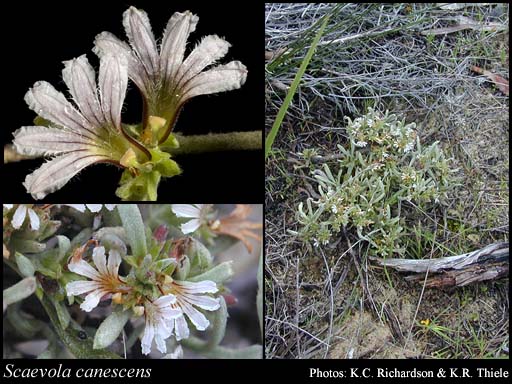- Reference
- Endl., Fenzl, Benth. & Schott, Enum.Pl. 69 (1837)
- Conservation Code
- Not threatened
- Naturalised Status
- Native to Western Australia
- Name Status
- Current
Prostrate to ascending shrub, 0.1-0.5 m high. Fl. white/white-purple, Mar to Oct. Sand, often with lateritic gravel, limestone.

Scientific Description
Stems unribbed. Leaves flat, 10-75 mm long, 2-10 mm wide, Indumentum present, with dense, simple hairs; margins entire. Bracteoles present, 2.5-4 mm long, hairy, with simple hairs. Pedicel pedicellate, Pedicel length the pedicels 0.5-1 mm long, Indumentum present, Hair type with simple hairs. Calyx lobes present, Calyx length 2.5-3 mm long, hairy, with dense, simple hairs. Corolla white, 8.5-10 mm long, without auricles, not spurred, hairy on the outside, with sparse, simple hairs, hairy on the inside, 0.3-0.8 mm wide. Anthers free. Ovary inferior, not gibbose; style 3-6 mm long, hairy; indusium single, hairy; ovules one or two. Flowers in March, April, May, June, July, August, September and October. Occurs in the Geraldton Sandplains (GS), Swan Coastal Plain (SWA), Avon Wheatbelt (AW) and Jarrah Forest (JF) IBRA Region(s), of the South West (SW) Botanical Province.
Distribution
- IBRA Regions
- Avon Wheatbelt, Geraldton Sandplains, Jarrah Forest, Swan Coastal Plain, Yalgoo.
- IBRA Subregions
- Dandaragan Plateau, Edel, Geraldton Hills, Lesueur Sandplain, Merredin, Northern Jarrah Forest, Perth.
- IMCRA Regions
- Central West Coast.
- Local Government Areas (LGAs)
- Cambridge, Carnamah, Chapman Valley, Claremont, Cockburn, Coorow, Cottesloe, Dandaragan, Gingin, Greater Geraldton, Irwin, Kalamunda, Mandurah, Melville, Mingenew, Moora, Mundaring, Nedlands, Northampton, Perth, Rockingham, Shark Bay, South Perth, Stirling, Swan, Three Springs, Victoria Park, Wanneroo, Waroona.